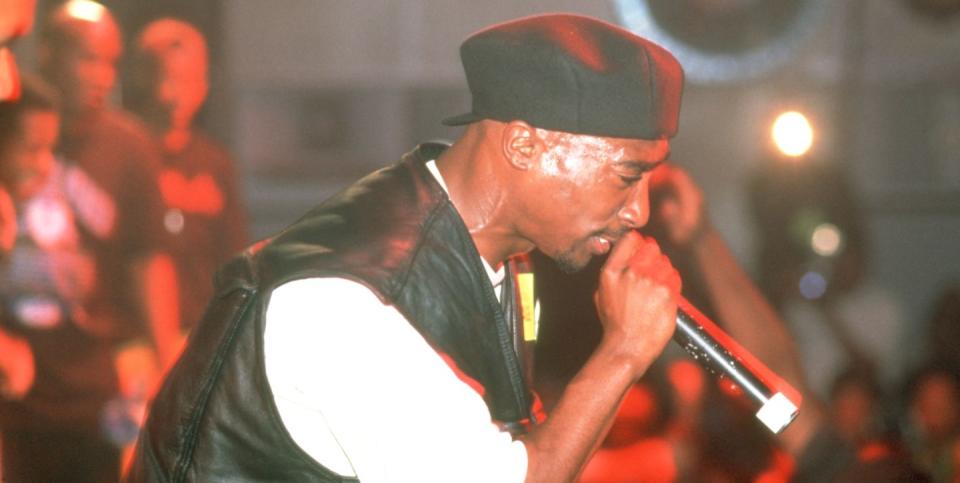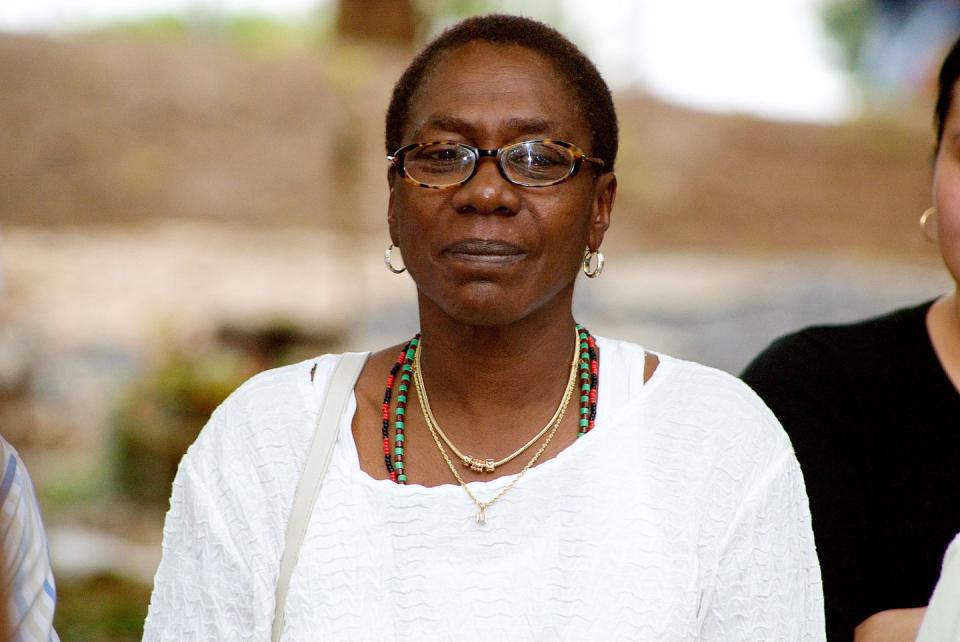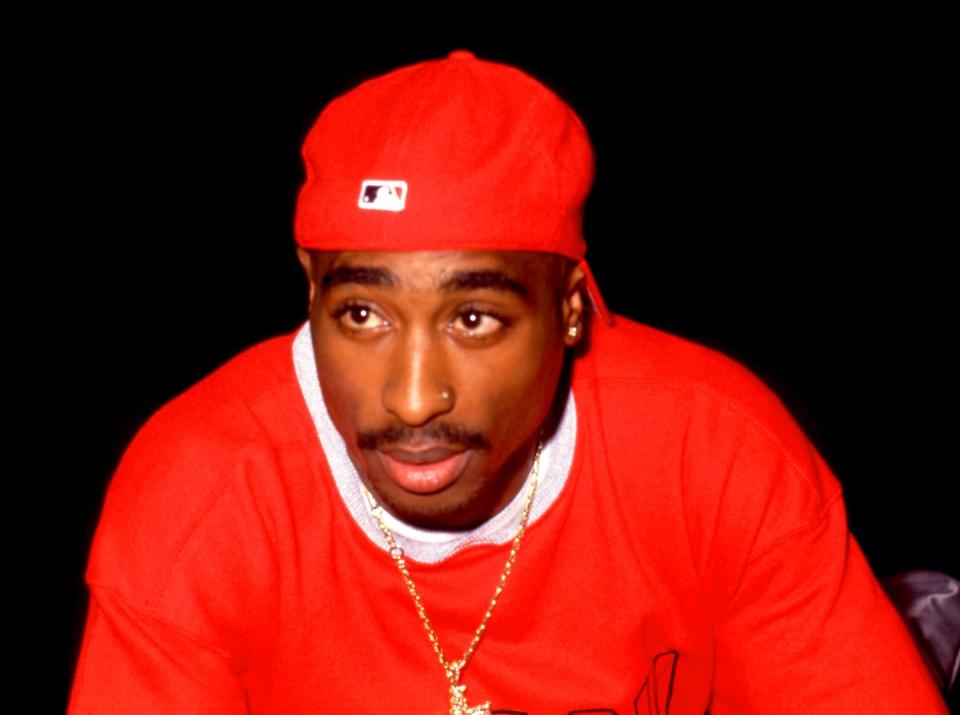“Dear Mama:” The Story Behind Tupac Shakur’s Hit Song about His Mother

"Hearst Magazines and Yahoo may earn commission or revenue on some items through these links."
Numerous tribute songs have been written over the years, but few might be as honest and emotionally raw as Tupac Shakur’s “Dear Mama.” Released in 1995, the song is about the rapper’s mother, Afeni Shakur, and details the family’s struggles with poverty, Afeni’s addiction, as well as Tupac’s love, forgiveness, and appreciation of her.
A new five-part docuseries, also called Dear Mama, reexamines the relationship between mother and son that Tupac first laid to bare in one of his most celebrated songs. The series highlights Tupac and Afeni’s estrangement and reconciliation, as well as Afeni’s political activism and efforts to overcome her drug addiction. The first two episodes premiere today on FX at 10 p.m. ET/PT and stream on Hulu Saturday.
Here is the story behind the song “Dear Mama” and the mother-son relationship that inspired it.
Who Was Afeni Shakur?

Afeni Shakur was a political activist and member of the Black Panther Party before her son Tupac was born. She was part of the Panther 21, a group of 21 Black Panther members arrested in 1969 for allegedly planning coordinated bombings and rifle attacks on police stations and offices in New York City.
The youngest of the group at age 22, Afeni faced a possible 300-year sentence if convicted. She was the first for whom the Black Panther Party raised bail so that she could help raise more money to have the others released. During her trial, Afeni represented herself, interviewing several witnesses on the stand.
Her cross-examination revealed that undercover police officers who had infiltrated the Black Panther Party had not actually witnessed any criminal activity. The Washington Post wrote that Afeni “demolished” the case, and the Panther 21 were acquitted in May 1971. She gave birth to Tupac one month later.
Tupac’s father, Billy Garland, lost contact with Afeni when Tupac was 5, and Tupac would not see him again until he was 23. Raising Tupac and his half-sister alone, Afeni worked as a paralegal before falling into a crack cocaine addiction in the early 1980s. The family had to move often, living off welfare because she could not keep a job, according to Vanity Fair.
Estranged, Then Reconciled

By 1989, Afeni and her children were living in California, and Tupac left home because he was “tired of watching his mother wither away,” according to People. As Tupac first began to achieve success as a rapper, Afeni was unaware of his career until friends told her. “I didn’t know what was happening to my son,” she said. “I thought, ‘What am I doing?’”
Afeni became determined to break her drug habit, which she finally did after moving back to New York City in 1991 and attending Narcotics Anonymous meetings. She and Tupac reconciled, and they remained close until his death in September 1996.
Moved by everything his mother had overcome in her life, Tupac started to write “Dear Mama,” in which he described living in poverty as a child, his mother’s drug habit, their estrangement, and their eventual reconciliation. In part of the song, he raps:
Even as a crack fiend, Mama
You always was a black queen, Mama
I finally understand
For a woman it ain’t easy tryin’ to raise a man
You always was committed
A poor single mother on welfare, tell me how you did it
There’s no way I can pay you back, but the plan
Is to show you that I understand: you are appreciated.
In the song, Shakur also discusses the lack of a father figure during his childhood and the fact that he and his younger sister wrongly blamed Afeni for his absence, writing: “No love from my daddy cause the coward wasn’t there / He passed away and I didn’t cry, cause my anger wouldn’t let me feel for a stranger.”
After writing it, he shared the lyrics with his longtime friend Jada Pinkett, whose mother had also struggled with drug addiction, according to the 2008 book Tupac Remembered: Bearing Witness to a Life and Legacy. “When I heard ‘Dear Mama,’ it gave me a rush of emotions; it still does when I hear it,” Pinkett said. “I marvel at his ability to be in a situation where he could reveal that about his mother. He could share the pain and the loss and the love and the undeniable connection that you have to your mother, no matter what’s going on.”
The Success of “Dear Mama”
“Dear Mama” was the lead track from Me Against the World (1995), one of Tupac’s most celebrated albums. Tupac was serving a prison sentence for a sexual assault case at the time “Dear Mama” was released as a single on February 21, 1995. It became his first top 10 song on the Billboard Hot 100 and would go on to become certified triple-platinum.
Describing the song in October 1995, Tupac said, “I wrote it for my mama because I love her and I felt I owed her something deep.”
The tribute is still considered one of his best songs and continues to receive acclaim long after the rapper’s death. Rolling Stone ranked it No. 18 on its “50 Greatest Hip-Hop Songs of All Time” list, and a BBC poll of critics found it to be among the 10 greatest hip-hop songs ever released.
In 2010, “Dear Mama” was inducted into the Library of Congress Recording Registry, which preserves “culturally, historically, or aesthetically significant works.” It was only the third hip-hop song to be inducted, following Grandmaster Flash and the Furious Five’s “The Message” and Public Enemy’s “Fear of a Black Planet.”
When “Dear Mama” was honored by the Library of Congress, Afeni reflected on her relationship with her son and the song’s broader appeal. “It could have been any song, but I’m honored they chose ‘Dear Mama’ in particular,’” she said. “It is a song that spoke not just to me but every mother that has been in that situation, and there have been millions of us. Tupac recognized our struggle, and he is still our hero.”
How to Watch Dear Mama
The first two episodes of Dear Mama premiere tonight at 10 p.m. ET/PT on FX. You can also watch them on Hulu starting Saturday. The final three episodes will release weekly on Fridays and stream next day on Hulu.

 money
money 